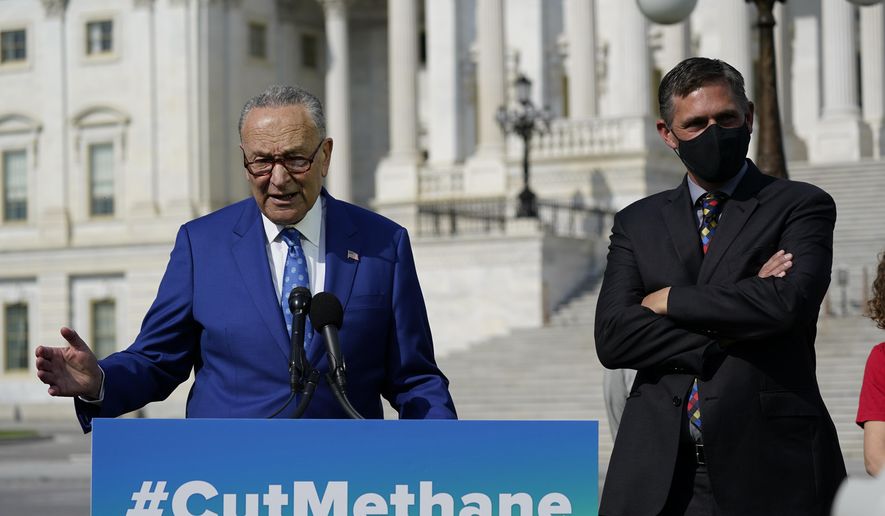The Senate used the Congressional Review Act on Wednesday to permanently overturn Trump-era guidelines on regulating methane, opening the door for President Biden to pursue a more aggressive stance.
In a bipartisan vote of 52-42, the Senate backed a resolution disapproving of limitations placed on the Environmental Protection Agency to regulate methane, a short-lived but potent greenhouse gas that is the primary component in natural gas.
“The reinstatement of the [regulations] dealing with methane emissions will be the most significant act this Senate has taken on climate change in more than a decade and maybe several decades,” said Senate Majority Leader Charles E. Schumer, New York Democrat.
The resolution was offered by Sens. Angus King, Maine independent, and Martin Heinrich, New Mexico Democrat, under the Congressional Review Act.
The resolution repudiates an August 2020 directive by former President Trump’s administration that limited the EPA’s ability to require oil and gas producers to detect and fix methane leaks. At the time, officials argued the energy industry was making headway in reducing methane emissions and the EPA should focus on curbing other air pollutants, especially those contributing to smog.
Democrats say that decision was not only wrong, but also put the nation at risk of further damage because of climate change.
“Regulating methane is the low-hanging fruit of climate action,” Mr. King said. “It is the simplest, most straightforward thing we can do to make a significant change in greenhouse gas emissions both here and abroad.”
While the decision by Democratic lawmakers to overturn the rule was expected, the party’s use of the Congressional Review Act was surprising. The act allows lawmakers to discard federal regulations finalized within the previous 60 legislative days.
The law has been used sparingly. Between its creation in 1996 and 2017, only one disapproval resolution was enacted.
The Congressional Review Act, though, is an increasingly attractive option for Democrats, who hold the Senate majority because of Vice President Kamala Harris’ tie-breaking vote.
In the Senate, a resolution of disapproval requires a simple majority of 51 votes for passage. As such, the Congressional Review Act provides Democrats with the ability to sidestep the filibuster, a legislative rule requiring at least 60 votes to end debate on legislation.
In the lead up to the vote, it appeared that action might not have been necessary as two Republicans, Sens. Lindsey Graham of South Carolina and Susan Collins of Maine, announced their support.
“I think it’s just unnecessary emissions that they can do something about, and they’ll need to do it,” Mr. Graham said.
When the votes were cast, however, the resolution did not come close to the 60 votes needed to beat any filibuster.
Republican lawmakers, in particular, objected to the resolution on both economic and environmental grounds.
Sen. Shelley Moore Capito of West Virginia, the top Republican on the Senate Environment and Public Works Committee, echoed the sentiment of the GOP majority when lambasting the resolution for trying to “demonize” energy producers.
“Let’s focus on solutions that will address our climate challenges without destroying the economic engines of growth,” the senator said, noting that the oil and gas industry had already reduced methane emissions significantly.
The resolution now heads to the House for consideration. If passed and signed by President Biden, the EPA would be permanently prohibited from reissuing the same regulation or one similar in scope unless Congress passes legislation instructing it to do so.
The White House this week endorsed the resolution, saying it would be a good first step toward “protecting American communities” from pollution.
Mr. Biden and his EPA administrator, Michael Regan, are planning to propose stronger regulations on methane emissions in September.
A study released this week in the journal of Environmental Research Letters argues a “full-scale effort to reduce methane emissions … could slow the worldwide rate of warming by as much as 30%.”
“Acting now and moving quickly to cut methane emissions is essential. Even modest delay would mean missing out on significant climate benefits. That’s an opportunity we won’t get back,” said Ilissa Ocko, a climate scientist at the Environmental Defense Fund who helped author the study.
• Haris Alic can be reached at halic@washingtontimes.com.




Please read our comment policy before commenting.